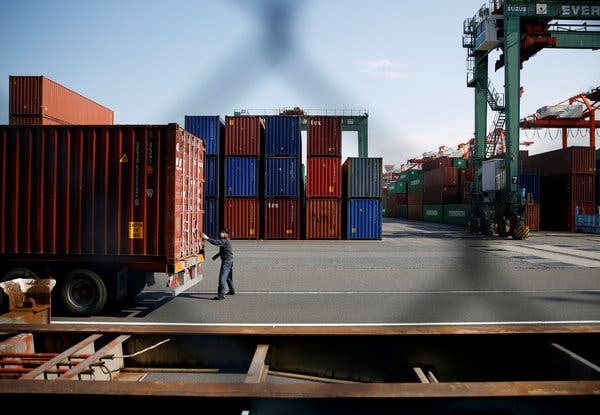Shipping Industry Responds To Trump's Houthi Truce Announcement With Caution

Table of Contents
Geopolitical Risks Remain Despite the Truce Announcement
Despite the Houthi truce announcement, the shipping industry remains wary. The region's inherent instability continues to pose significant challenges for maritime commerce.
Security Concerns in the Red Sea and Bab el-Mandeb Strait
The Red Sea and the Bab el-Mandeb Strait remain hotspots for various security concerns, directly impacting Red Sea shipping lanes. The Yemen conflict's ripple effects haven't disappeared overnight.
- Piracy: While significantly reduced in recent years, the risk of piracy and armed robbery against ships remains a persistent threat. Incidents, though less frequent, highlight the vulnerability of vessels transiting this strategically important waterway.
- Renewed Conflict: The truce's fragility is a major concern. The potential for renewed conflict between the warring factions poses a considerable risk to shipping operations, potentially leading to disruptions and closures of vital shipping routes.
- Presence of Armed Groups: The presence of various armed groups in coastal areas continues to pose a risk, creating uncertainty and the potential for attacks targeting vessels. This necessitates robust security measures.
- Impact on Shipping: Past conflicts have demonstrated the devastating impact on shipping. Vessel seizures, delays, and diversions have resulted in substantial financial losses and supply chain disruptions. The memory of these incidents fuels ongoing anxieties within the industry.
Insurance Premiums and Operational Costs
The uncertainty surrounding the Houthi truce significantly impacts the cost of doing business for shipping companies.
- Increased Insurance Premiums: Maritime insurance premiums for vessels transiting the Red Sea and the Bab el-Mandeb Strait are likely to remain high, reflecting the ongoing geopolitical risks and the potential for disruptions. Insurers carefully assess risk, and any perceived increase in instability translates directly into higher premiums.
- Higher Operational Costs: Shipping lines may face increased fuel costs due to longer transit times via alternative routes (discussed further below), and other operational expenses related to enhanced security measures.
- Risk Assessment Fluctuation: Shipping lines continuously monitor and adjust to fluctuating risk assessments. Any perceived shift in the security situation, even a minor one, can prompt immediate responses impacting operational strategies and costs. Freight rates often reflect these risk evaluations.
Impact on Shipping Routes and Trade Flows
The Houthi truce, even if held, will likely have a lasting effect on shipping routes and global trade flows.
Alternative Routes and Increased Transit Times
Uncertainty in the Red Sea area often leads to ships rerouting.
- Cape of Good Hope Route: The longer journey around the Cape of Good Hope is a common alternative, significantly increasing transit times and associated costs. This adds considerable expense and delays to delivery schedules impacting global supply chains.
- Transit Time Increase: Longer transit times translate directly to higher fuel consumption, crew costs, and potential cargo spoilage, all contributing to increased expenses.
- Global Supply Chain Disruptions: These disruptions cascade throughout global supply chains, affecting businesses relying on timely deliveries of goods. The ripple effects can be far-reaching.
Effect on Oil and Gas Shipments
The Red Sea region is a critical transit point for oil and gas shipments.
- Oil Tanker Shipping: Disruptions to oil tanker shipping through the Red Sea can lead to price volatility and potential energy shortages in global markets.
- LNG Shipping: Similar vulnerabilities exist for LNG (liquefied natural gas) shipments, highlighting the region's critical role in global energy security.
- Crude Oil Transport: Any significant disruption in crude oil transport from the region has the potential to cause significant price fluctuations and instability in the global energy market.
The Shipping Industry's Response and Adaptation
The shipping industry is adapting to the ongoing challenges.
Increased Vigilance and Risk Management Strategies
Shipping companies are implementing numerous strategies to mitigate risks.
- Enhanced Surveillance: Increased use of satellite monitoring, improved intelligence gathering, and enhanced communication systems are all crucial aspects of risk mitigation.
- Armed Guards: Deploying armed security personnel onboard vessels remains a common practice, especially for high-value cargo shipments.
- Route Diversification: Exploring and using alternative routes, even if more costly, is a key strategy to manage risk and ensure operational continuity.
- Improved Communication: Robust communication networks and protocols are essential for sharing real-time information about potential threats and coordinating responses.
Collaboration with Governmental and International Organizations
The shipping industry relies on cooperation from several entities.
- IMO Regulations: Compliance with International Maritime Organization (IMO) regulations and best practices is crucial for enhancing maritime security.
- Maritime Cooperation: Increased cooperation among shipping companies, governments, and international organizations is paramount in addressing security challenges.
- International Maritime Security: Joint efforts by governments and international bodies to enhance security in the region are vital to protecting shipping and ensuring safe passage.
- Government Regulations: Effective government policies and regulations are essential for creating a stable environment conducive to safe maritime operations. Port security measures are a crucial component of this.
Conclusion: Cautious Optimism and the Path Forward for Shipping in the Region
The Houthi truce announcement offers a glimmer of hope, but the shipping industry remains rightfully cautious. The continued geopolitical risks, the impact on shipping routes and trade flows, and the industry's cautious yet adaptive response all highlight the complexities of navigating this volatile region. While the truce presents potential benefits, the underlying security concerns persist. Stay informed on Houthi truce developments, monitor the impact on shipping routes, understand the evolving risks in the Red Sea, and learn more about the shipping industry’s response to the Houthi truce. Closely monitoring the situation in Yemen and its impact on the shipping industry remains crucial to minimizing risks in this volatile region.

Featured Posts
-
 Open Ai Under Ftc Scrutiny Chat Gpts Future Uncertain
May 10, 2025
Open Ai Under Ftc Scrutiny Chat Gpts Future Uncertain
May 10, 2025 -
 Invest Smart A Guide To The Countrys Rising Business Hot Spots
May 10, 2025
Invest Smart A Guide To The Countrys Rising Business Hot Spots
May 10, 2025 -
 Rhlt Fyraty Mn Alahly Almsry Ila Alerby Alqtry Ihsayyat Wadae
May 10, 2025
Rhlt Fyraty Mn Alahly Almsry Ila Alerby Alqtry Ihsayyat Wadae
May 10, 2025 -
 Uk City Transformed Caravan Dwellers And Growing Ghetto Concerns
May 10, 2025
Uk City Transformed Caravan Dwellers And Growing Ghetto Concerns
May 10, 2025 -
 Edmonton Oilers Leon Draisaitls Recovery Timeline And Impact On Playoffs
May 10, 2025
Edmonton Oilers Leon Draisaitls Recovery Timeline And Impact On Playoffs
May 10, 2025
